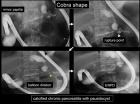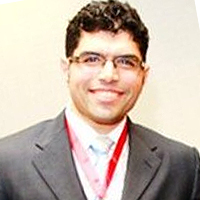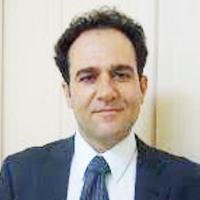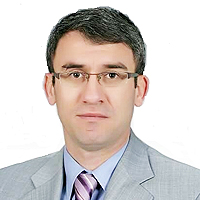Abstract
Research Article
Ultraviolet fluorescent detection of elevated bilirubin in dried blood serum
Kelly P Kearse*
Published: 23 September, 2022 | Volume 6 - Issue 1 | Pages: 049-052
Increased levels of bilirubin in blood serum may result from numerous physical conditions including hepatitis, cirrhosis, enzyme deficiency, drug reactions, autoimmune disorders and physiological trauma. No presumptive test for high bilirubin levels in blood serum stains currently exists, which could prove useful in the assessment of crime scenes involving victims with one of the above disorders. Here, the use of ultraviolet 365 (UV 365) is described as a simple, nondestructive method for the detection of blood serum containing elevated levels of bilirubin.
Read Full Article HTML DOI: 10.29328/journal.jfsr.1001036 Cite this Article Read Full Article PDF
References
- Fevery J. Bilirubin in clinical practice: a review. Liver Int. 2008 May;28(5):592-605. doi: 10.1111/j.1478-3231.2008.01716.x. PMID: 18433389.
- Fargo MV, Grogan SP, Saguil A. Evaluation of Jaundice in Adults. Am Fam Physician. 2017 Feb 1;95(3):164-168. PMID: 28145671.
- Muchowski KE. Evaluation and treatment of neonatal hyperbilirubinemia. Am Fam Physician. 2014 Jun 1;89(11):873-8. PMID: 25077393.
- Gondal B, Aronsohn A. A Systematic Approach to Patients with Jaundice. Semin Intervent Radiol. 2016 Dec;33(4):253-258. doi: 10.1055/s-0036-1592331. PMID: 27904243; PMCID: PMC5088098.
- Purohit T, Cappell MS. Primary biliary cirrhosis: Pathophysiology, clinical presentation and therapy. World J Hepatol. 2015 May 8;7(7):926-41. doi: 10.4254/wjh.v7.i7.926. PMID: 25954476; PMCID: PMC4419097.
- Kalakonda A, Jenkins BA, John S. Physiology, Bilirubin. [Updated 2021 Sep 16]. In: StatPearls [Internet]. Treasure Island (FL): StatPearls Publishing; 2022. https://www.ncbi.nlm.nih.gov/books/NBK470290/
- Hossain MR, Pandey RK, Islam MF, Datar P, Gayam V, Puri P, Malar T. Acute Isolated Hyperbilirubinemia as a Presentation of Alcoholic Liver Disease: A Case Report and Literature Review. Case Reports Hepatol. 2018 Feb 12;2018:9403934. doi: 10.1155/2018/9403934. PMID: 29623226; PMCID: PMC5829357.
- Scharf C, Liebchen U, Paal M, Becker-Pennrich A, Irlbeck M, Zoller M, Schroeder I. Successful elimination of bilirubin in critically ill patients with acute liver dysfunction using a cytokine adsorber and albumin dialysis: a pilot study. Sci Rep. 2021 May 13;11(1):10190. doi: 10.1038/s41598-021-89712-4. PMID: 33986443; PMCID: PMC8119427.
- Souza MV, Novaes FS. Icterícia grave e miocardiopatia tireotóxica com trombo atrial [Serious jaundice and thyrotoxic myocardiopathy with atrial thrombus]. Arq Bras Endocrinol Metabol. 2012 Oct;56(7):456-60. Portuguese. doi: 10.1590/s0004-27302012000700008. PMID: 23108751.
- Ali H, Rizvi T, Niazi M, Galan M, Pyrsopoulos N. Autoimmune Hepatitis Induced after Treatment of Syphilitic Hepatitis. J Clin Transl Hepatol. 2022 Feb 28;10(1):174-177. doi: 10.14218/JCTH.2020.00178. Epub 2021 May 31. PMID: 35233387; PMCID: PMC8845154.
- Baig M, Zheng L, Farmer A. Severe Hyperbilirubinemia: A Rare Complication of Lyme Disease. Case Rep Gastrointest Med. 2019 Dec 24;2019:2762389. doi: 10.1155/2019/2762389. PMID: 31956450; PMCID: PMC6949660.
- Lin PMF, Chow SCY, Ng SWY, Ho AMH, Wan S. Acute liver failure with extreme hyperbilirubinemia secondary to endocarditis-related severe mitral and tricuspid regurgitation: a challenge and an opportunity for surgeons. J Thorac Dis. 2018 Feb;10(2):1067-1071. doi: 10.21037/jtd.2018.01.138. PMID: 29607182; PMCID: PMC5864625.
- Labori KJ, Raeder MG. Diagnostic approach to the patient with jaundice following trauma. Scand J Surg. 2004;93(3):176-83. doi: 10.1177/145749690409300302. PMID: 15544071.
- Cambou M, Greeley AM. Clinical Vignette: A case of autoimmune hepatitis. Proc UCLA Healthcare 2015; 19:1-3.
- Kearse KP. Ultraviolet 365 as an Alternative Light Source for Detection of Blood Serum. J Forensic Sci. 2020 Sep;65(5):1716-1721. doi: 10.1111/1556-4029.14439. Epub 2020 Apr 28. PMID: 32343369; PMCID: PMC7496641.
- Kearse KP. Environmental influence on blood serum detection using ultraviolet 365. J. Forensic Sci Res. 2021; 5: 130-036. doi: 10.29328/journal.jfsr.1001024
- Kearse KP. The reddish color of bloodstains on the Shroud of Turin: investigation of two hypotheses. J His Arch & Anthropol Sci. 2020; 5:101‒107. DOI: 10.15406/jhaas.2020.05.00223
Figures:
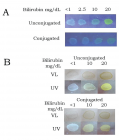
Figure 1
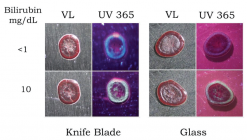
Figure 2

Figure 3

Figure 4
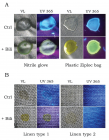
Figure 5
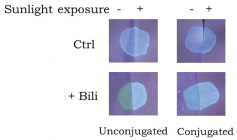
Figure 6
Similar Articles
-
Poly-dopamine-Beta-Cyclodextrin Modified Glassy Carbon Electrode as a Sensor for the Voltammetric Detection of L-Tryptophan at Physiological pHMohammad Hasanzadeh*,Nasrin Shadjou,Sattar Sadeghi,Ahad Mokhtarzadeh,Ayub karimzadeh. Poly-dopamine-Beta-Cyclodextrin Modified Glassy Carbon Electrode as a Sensor for the Voltammetric Detection of L-Tryptophan at Physiological pH . . 2017 doi: 10.29328/journal.jfsr.1001001; 1: 001-009
-
WMW: A Secure, Web based Middleware for C4I Interoperable ApplicationsNida Zeeshan*. WMW: A Secure, Web based Middleware for C4I Interoperable Applications. . 2017 doi: 10.29328/journal.jfsr.1001002; 1: 010-017
-
Associations of Burnout, Secondary Traumatic Stress and Individual Differences among Correctional Psychologists`Irina G. Malkina-Pykh*. Associations of Burnout, Secondary Traumatic Stress and Individual Differences among Correctional Psychologists`. . 2017 doi: 10.29328/journal.jfsr.1001003; 1: 018-034
-
Anatomical Distribution of Intramuscular LipomasN K Sferopoulos*. Anatomical Distribution of Intramuscular Lipomas. . 2017 doi: 10.29328/journal.jfsr.1001004; 1: 035-039
-
Comparison of Vitreous Protein Profiles of Rabbits subjected to Acute Carbon Monoxide poisoning and normal animal after deathAgoro ES*,Akubugwo EI,Chinyere GC,Samuel R. Comparison of Vitreous Protein Profiles of Rabbits subjected to Acute Carbon Monoxide poisoning and normal animal after death. . 2017 doi: 10.29328/journal.jfsr.1001005; 1: 040-045
-
The Effect of Cement and wrapping on the Decomposition rate of the Rabbit CarcassesLai Poh Soon*,Khoo Lay See,Nazni Wasi Ahmad,Azlina Zulkapli,Nurul Kharmila Abdullah,Mohd Shah Mahmood,Ahmad Hafizam Hasmi. The Effect of Cement and wrapping on the Decomposition rate of the Rabbit Carcasses. . 2017 doi: 10.29328/journal.jfsr.1001006; 1: 046-062
-
Potter Syndrome: A case studyAnestakis D*,Konstantinidou,Nikolaou A,Moumou G,Karakasi MV,Pavlidis P,Chatzifotiou E. Potter Syndrome: A case study. . 2017 doi: 10.29328/journal.jfsr.1001007; 1: 063-067
-
Organic compositional analysis of propellant powders using monolithic material sorption extraction (MSSE)-a feasibility studyJason W Birkett*,Ellen Goudsmits,George P Sharples. Organic compositional analysis of propellant powders using monolithic material sorption extraction (MSSE)-a feasibility study . . 2017 doi: 10.29328/journal.jfsr.1001008; 1: 068-076
-
Unrecognized myocardial infarction in the elderlyInge Morild*,Bjorn Maehle,Peer K Lilleng,Haakon H Eilertsen. Unrecognized myocardial infarction in the elderly. . 2017 doi: 10.29328/journal.jfsr.1001009; 1: 077-086
-
Enclosure asphyxia as a cause of death in 3 Nigerian children trapped at the boot of car-Case reports and review of literatureMartin A Nzegwu*,FMCPath Nig,DB Olusina Francis Ikechukwu Ukekwe,Victor Nzegwu. Enclosure asphyxia as a cause of death in 3 Nigerian children trapped at the boot of car-Case reports and review of literature. . 2017 doi: 10.29328/journal.jfsr.1001010; 1: 087-091
Recently Viewed
-
Navigating Neurodegenerative Disorders: A Comprehensive Review of Current and Emerging Therapies for Neurodegenerative DisordersShashikant Kharat*, Sanjana Mali*, Gayatri Korade, Rakhi Gaykar. Navigating Neurodegenerative Disorders: A Comprehensive Review of Current and Emerging Therapies for Neurodegenerative Disorders. J Neurosci Neurol Disord. 2024: doi: 10.29328/journal.jnnd.1001095; 8: 033-046
-
Metastatic Brain Melanoma: A Rare Case with Review of LiteratureNeha Singh,Gaurav Raj,Akshay Kumar,Deepak Kumar Singh,Shivansh Dixit,Kaustubh Gupta*. Metastatic Brain Melanoma: A Rare Case with Review of Literature. J Radiol Oncol. 2025: doi: 10.29328/journal.jro.1001080; 9: 050-053
-
Validation of Prognostic Scores for Attempted Vaginal Delivery in Scar UterusMouiman Soukaina*,Mourran Oumaima,Etber Amina,Zeraidi Najia,Slaoui Aziz,Baydada Aziz. Validation of Prognostic Scores for Attempted Vaginal Delivery in Scar Uterus. Clin J Obstet Gynecol. 2025: doi: 10.29328/journal.cjog.1001185; 8: 023-029
-
Scientific Analysis of Eucharistic Miracles: Importance of a Standardization in EvaluationKelly Kearse*,Frank Ligaj. Scientific Analysis of Eucharistic Miracles: Importance of a Standardization in Evaluation. J Forensic Sci Res. 2024: doi: 10.29328/journal.jfsr.1001068; 8: 078-088
-
A study of coagulation profile in patients with cancer in a tertiary care hospitalGaurav Khichariya,Manjula K*,Subhashish Das,Kalyani R. A study of coagulation profile in patients with cancer in a tertiary care hospital. J Hematol Clin Res. 2021: doi: 10.29328/journal.jhcr.1001015; 5: 001-003
Most Viewed
-
Evaluation of Biostimulants Based on Recovered Protein Hydrolysates from Animal By-products as Plant Growth EnhancersH Pérez-Aguilar*, M Lacruz-Asaro, F Arán-Ais. Evaluation of Biostimulants Based on Recovered Protein Hydrolysates from Animal By-products as Plant Growth Enhancers. J Plant Sci Phytopathol. 2023 doi: 10.29328/journal.jpsp.1001104; 7: 042-047
-
Sinonasal Myxoma Extending into the Orbit in a 4-Year Old: A Case PresentationJulian A Purrinos*, Ramzi Younis. Sinonasal Myxoma Extending into the Orbit in a 4-Year Old: A Case Presentation. Arch Case Rep. 2024 doi: 10.29328/journal.acr.1001099; 8: 075-077
-
Feasibility study of magnetic sensing for detecting single-neuron action potentialsDenis Tonini,Kai Wu,Renata Saha,Jian-Ping Wang*. Feasibility study of magnetic sensing for detecting single-neuron action potentials. Ann Biomed Sci Eng. 2022 doi: 10.29328/journal.abse.1001018; 6: 019-029
-
Pediatric Dysgerminoma: Unveiling a Rare Ovarian TumorFaten Limaiem*, Khalil Saffar, Ahmed Halouani. Pediatric Dysgerminoma: Unveiling a Rare Ovarian Tumor. Arch Case Rep. 2024 doi: 10.29328/journal.acr.1001087; 8: 010-013
-
Physical activity can change the physiological and psychological circumstances during COVID-19 pandemic: A narrative reviewKhashayar Maroufi*. Physical activity can change the physiological and psychological circumstances during COVID-19 pandemic: A narrative review. J Sports Med Ther. 2021 doi: 10.29328/journal.jsmt.1001051; 6: 001-007

HSPI: We're glad you're here. Please click "create a new Query" if you are a new visitor to our website and need further information from us.
If you are already a member of our network and need to keep track of any developments regarding a question you have already submitted, click "take me to my Query."










